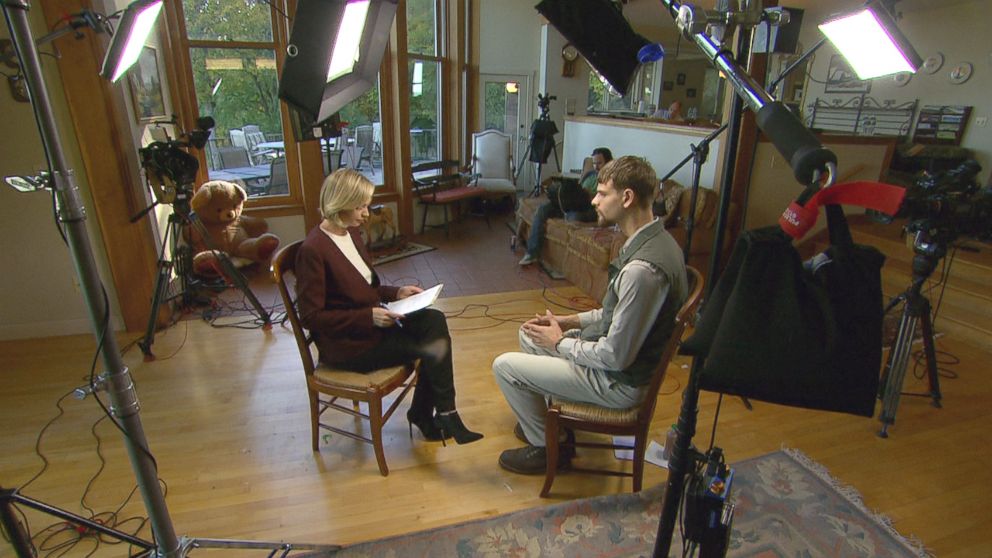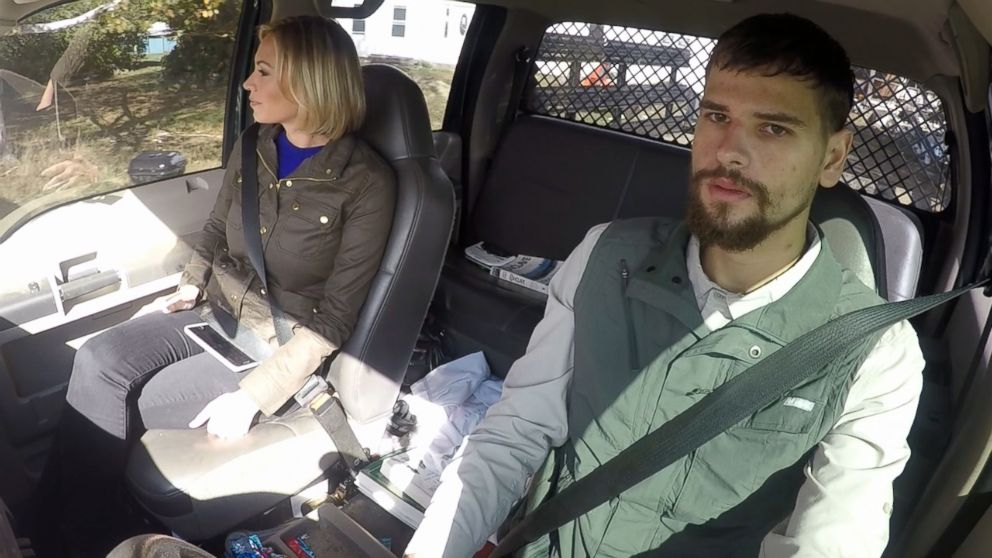Reporter's notebook: What it was like to interview rescued boater Nathan Carman
Nathan Carman was rescued while stranded at sea, but his mother did not survive.
— -- It was Monday morning, Sept. 26, when the news desk asked me to monitor a U.S. Coast Guard “presser” out of Boston -- a press conference about a man rescued after a week at sea.
It didn’t sound real. I started looking around online and found local media had been covering the story of a mother and son who went on a fishing trip and never returned. The Coast Guard had searched an area larger than the state of Georgia for six days and had just called off the mission when 22-year-old Nathan Carman was picked up by a passing cargo ship. It was real, but I’d never heard anything like it outside of the movies.

USCG Petty Officer Nicole Groll led the news conference. She had very few details to share and the press pack was ravenous. All she could say was that Nathan Carman was found in a life raft with food and water and was in good condition. No, she said, his mother was not found. And no, she said she didn’t know why Linda Carman had apparently not survived.But then she said, “When Nathan Carman comes back to shore, he will be met with Coast Guard officials who will be speaking with him to get a clear understanding of the case.”
The local reporters started firing questions at her. “Is he in custody?” “Is he under suspicion?”
Petty Officer Groll seemed to backtrack a bit, saying they just wanted to speak with him in order to “prevent something like this from happening again.”
But I couldn’t get over those questions from reporters and I had a strong sense that there was much more to this story.
Producer Michael Mendelsohn managed to get Linda’s best friend, Sharon Hartstein, on the phone. She told us she had reported Nathan and Linda missing. Linda had sent Hartstein a text of their “float plan," instructing her to call her if they weren’t back by lunchtime. She also confirmed that Nathan had been diagnosed with Asperger's syndrome, which is an Autism Spectrum Disorder.

The next morning, Nathan arrived in Boston and I’ll never forget that first image of him, that expressionless stare.
By that evening, Nathan was back in Vermont. His father, who flew in from California, dropped him off at home and headed to see Linda’s family in Connecticut. Nathan was alone again.
I remember thinking, “This poor guy has been through a living nightmare and no one is going to stay the night with him?"
It was right about then that I found out police had been searching Nathan’s home, before he was even back on dry land. We got a copy of the search warrant and it was a bombshell.
Police said an investigation had revealed that Nathan had been conducting repairs on his boat, “which could have potentially rendered it unsafe for operation."
One man told them he’d seen Nathan drilling holes in his boat just hours before setting off on that ill-fated fishing trip. And a friend of Linda's told them Linda thought she was going fishing near Block Island, roughly 20 miles off shore, and Linda had refused to go any farther than that. Nathan was found 100 miles off shore. Police were looking for evidence that would support a charge of “operating so as to endanger, resulting in death.”
I thought, “Why would anyone sabotage their own boat? And were police suggesting Nathan had killed his mother?”
The next morning I woke up to another jaw-dropping development. Hartford Courant reporter Dave Altimari published a story revealing police had wanted to arrest Nathan in 2014 for the murder of his grandfather.
I got a copy of the police documents. Investigators in Windsor, Connecticut, had a list of circumstantial evidence they felt tied Nathan to the crime, but a judge wouldn’t sign their arrest warrant.
We got Sharon Hartstein back on the phone and she gave us Nathan’s number. A gift! I called right away, no answer. So, I got in the car in New York and started driving to Vermont hoping for the best. Then Nathan texted me back. He was up for talking.
We had a couple of conversations on the phone and he agreed to sit down with me exclusively. He said he’d seen the media reports about him and he felt they were inaccurate. He said he wanted to set the record straight. He suggested we meet at a park near our hotel because reporters were camped out on his lawn.
During the rest of the drive up, I was scrambling to do my research on Nathan. The story now felt totally surreal. Nathan was the last known person to see two of his family members alive. Then we saw the billboard along I-91 in Hartford. A giant photo of Nathan’s grandfather, John Chakalos, a nursing home and real estate developer who’d been worth tens of millions of dollars. His daughters were offering a $250,000 reward for information on his killer.
When we finally arrived, Nathan shook my hand and was very polite. He had a jug of apple cider with him and was gripping a pad of paper. He seemed traumatized. I could tell this was going to be really tough for him, not just because of what he’d been through, but because social interaction in general was a challenge for him.
Within moments of sitting down with Nathan I could see why some might interpret his behavior as suspicious. He seemed to need to feel in control of our conversation. He would stop in the middle of a sentence for no apparent reason, take a long pause for no apparent reason, then start again. He didn’t like being interrupted. If he didn’t want to answer a question, he would say “we’re moving on” or “we’re stopping right there." I was conscious of not wanting to upset him. I needed him to open up and trust me.
When I asked Nathan about the repairs he made to his boat that police had quizzed him about, he said, “I’m not going to get into specifics,” only saying, “I would not have taken my mom out fishing with me had I not believed the boat was seaworthy.”
How and why did his 31-foot boat, "The Chickenpox," sink? Nathan estimates it took between three and five minutes from the moment he realized the boat was taking on water to when it became submerged.
"I was walking on the deck, it was there and then it wasn’t and that’s that," he said.
And where was his mom during these three to five minutes? He said she was at the back of the boat bringing in the reels as he’d instructed her to; he was carrying safety gear to the front. He said he simply doesn’t remember seeing or hearing her after that moment.
We spoke for 90 minutes, but I left our interview a little confused. “Wasn’t Nathan’s motivation in talking to me to tell his entire story and in doing so, show people he had nothing to hide?”

A few days later, we showed the tape of our interview to Dr. Rebecca Sachs, a psychologist who specializes in treatment of individuals with Autism Spectrum Disorder, and what she told us explained a lot.
She didn’t find Nathan’s behavior unusual, saying, “People with Asperger’s... may seem evasive.”
We may think they are stalling for time when, in fact, “They’re trying to process information,” she said, noting they also often order their thoughts in ways others might find unusual. She said she tells her patients they will often be misunderstood, including by members of law enforcement.
So, maybe some of that seemingly defensive or suspicious behavior can be explained by Nathan’s Asperger’s. Still, I wondered, "Does Nathan’s condition explain everything?"
After our meeting, I had been asking Nathan if he’d meet me again, texting him every couple of days. I was thinking about him a lot. “If, as he says, this is all the result of terrible luck, how awful must that be for him?" I thought.
Nathan agreed to talk again, inviting "20/20" producer Tom Berman and me back to Vermont eight days after our first meeting.
This time, he said he was prepared to discuss most of the allegations against him and to tell us more about his past. But communicating was still a challenge.
At one point, Nathan stormed out of the interview. I asked him to please sit back down, because this was his opportunity to answer his critics. He did. This time, he told me why he removed parts on his boat the day of the trip and exactly how he survived all those days lost at sea.
And when it came to his grandfather’s murder, he explained why he thinks his Asperger’s has made him a target for police, saying, “They saw me as the lowest hanging fruit.”
The problem for Nathan is that for all his answers, the questions don’t seem to go away.
Just this week, the insurance company investigating Nathan’s claim on his boat concluded "the loss was caused intentionally." I wanted to ask Nathan for his reaction, but his phone had been disconnected. He never spoke with me again after our second interview.
Watch "Lost at Sea: Mystery or Murder?" on ABC News' "20/20" on Friday, Feb. 3, at 10 p.m. ET.



